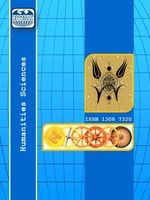BAĞDATLI RUHÎ'NİN MEŞHUR TERKİB-BENDİNESOSYAL PSİKOLOJİ AÇISINDAN BİR BAKIŞ
Bu terkib-bendinde Bağdatlı Ruhî'nin, Osmanlı Müslüman toplumunda bulunan, değişik unvan ve statülere sahip, sosyal tipleri ve sosyal grupları bazı tutum ve davranışlarıyla eleştirdiği görülmüştür. Şairin, bu eserinde saydığı ve sosyal davranışlarını gösterip eleştirdiği kişilik ve gruplar: toplumun yönetici ve zengin grubunu oluşturan, sosyal, siyasî ve ekonomik yönden statü ve üstünlük kazanmış, havas-has, ayan, paşa, bey ve hâce unvanları ile anılan zengin zümre; bir varlığa sahip olamayan, daha çok toprağa bağlı işçi olarak çalışan, avam-am adlarıyla anılan, eğitimsiz, aşağı ve alt tabaka; zahit, sofu isimleriyle bilinen, az çok okumuş yahut, cami ve tekkelerde kulaktan dolma dinî bilgiler edinmiş bağnaz kesim; aydın, entelektüel, hür düşünceye sahip, aşık ve rint tabiatlı olan şairler grubu. Ruhî bu kişi ve grupların toplum içerisindeki tutum ve davranışlarını eleştirmiştir. Bu makalede, bu eserin konusu olan sosyal tip ve grupların davranışları incelenmiş ve manzumeye sosyal psikoloji açısından bir açıklama getirilmiştir.
Anahtar Kelimeler:
Bağdatlı Ruhî, Sosyal Psikoloji, Sosyal Eleştiri, , , , , ,
A FOCUS ON BAGHDADI RUHI'S TERKIB-BEND REGARDING THE SOCIAL PSYCHOLOGY
In his poem, it is seen that Baghdadi Ruhi has criticized the attitudes and behaviours of some social types and groups having various ranks and statues in ottoman muslim society. The personalities and groups mentioned and criticized by the poet in his work because of their social behaviours are, the rich class consisting the management and rich group of society and having the status and superiority with regard to social, political and economics and being mentioned with the ranks "havas-has, ayan, pasha, sir and hace, the uneducated over class having nothing and working as farmers at the land and being mentioned with the names of upper-class, the bigoted class known with the names of zahit, sofu; having a lower education or picked up religious knowledge here and there by listening in the mosques and tekkes, and the group of poets being intellectual, having free thought, lovers and being rint-natured. Ruhi has criticized the attitudes and behaviours of these personalities and groups in the society. In this article, the behaviours of social types and groups being the main theme of this work have been examined, and an explanation in the point of social psychology has been made on the poem.
Keywords:
Baghdadi Ruhi, Social Psychology, Social Criticism, , , , , ,
- Başlangıç: 2009
- Yayıncı: E-Journal of New World Sciences Academy
